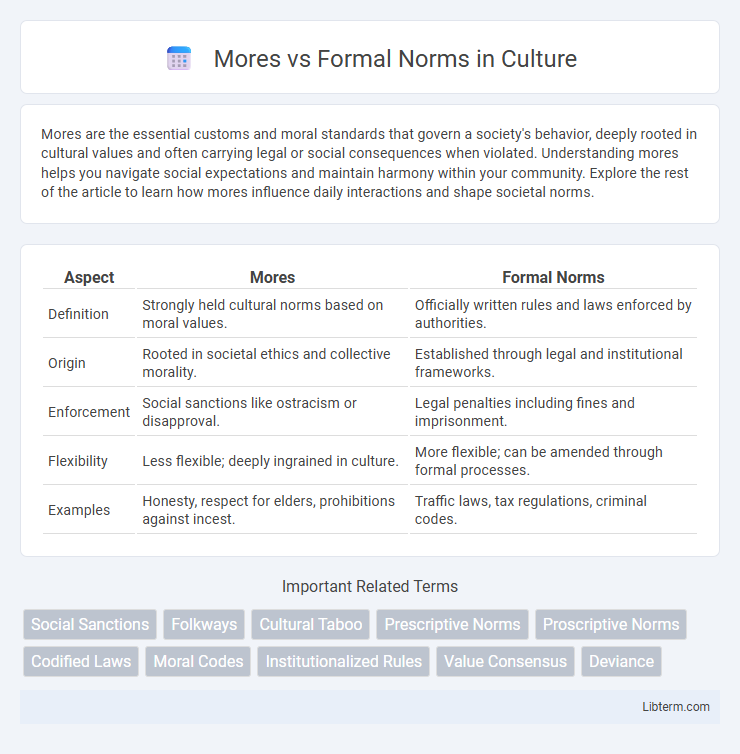Mores are the essential customs and moral standards that govern a society's behavior, deeply rooted in cultural values and often carrying legal or social consequences when violated. Understanding mores helps you navigate social expectations and maintain harmony within your community. Explore the rest of the article to learn how mores influence daily interactions and shape societal norms.
Table of Comparison
| Aspect | Mores | Formal Norms |
|---|---|---|
| Definition | Strongly held cultural norms based on moral values. | Officially written rules and laws enforced by authorities. |
| Origin | Rooted in societal ethics and collective morality. | Established through legal and institutional frameworks. |
| Enforcement | Social sanctions like ostracism or disapproval. | Legal penalties including fines and imprisonment. |
| Flexibility | Less flexible; deeply ingrained in culture. | More flexible; can be amended through formal processes. |
| Examples | Honesty, respect for elders, prohibitions against incest. | Traffic laws, tax regulations, criminal codes. |
Defining Mores and Formal Norms
Mores are socially significant norms that govern moral and ethical behavior within a society, often rooted in collective values and customs, emphasizing right and wrong conduct. Formal norms are codified rules or laws established by authoritative institutions, designed to regulate behavior through explicit written regulations and enforceable sanctions. Understanding the distinction highlights that mores influence social expectations informally, while formal norms provide structured legal frameworks for compliance.
Key Differences Between Mores and Formal Norms
Mores are social norms that embody moral values and are strictly enforced within a community, often governing behaviors related to right and wrong, whereas formal norms are codified rules and laws established by official institutions to regulate behavior with clear legal consequences. Mores typically arise from cultural and ethical beliefs and are enforced through social sanctions like ostracism, while formal norms rely on legal systems for enforcement through penalties or punishments. The key difference lies in the source of authority and enforcement mechanism--informal social consensus for mores versus institutional authority for formal norms.
Historical Evolution of Mores and Formal Norms
Mores originally developed as deeply rooted social customs and moral beliefs that guided communal behavior and ensured social cohesion in early societies, evolving through oral traditions and shared values. Formal norms emerged later with the rise of structured civilizations, codified into laws and regulations to maintain order as societies grew more complex and diverse. The historical evolution of mores reflects moral consensus shaped by cultural continuity, while formal norms embody institutionalized rules enforced by authorities to regulate conduct systematically.
The Social Importance of Mores
Mores are deeply ingrained social norms that reflect a community's core values and define acceptable moral behavior, carrying significant social weight and consequences for violations, often more severe than breaches of formal norms. These unwritten rules shape social cohesion by promoting conformity to essential ethical standards and preserving cultural identity. Unlike formal norms, which are codified laws and regulations enforced by institutions, mores derive their power from collective societal agreement and moral consensus.
Legal Frameworks: Understanding Formal Norms
Formal norms within legal frameworks consist of codified rules and regulations established by governing authorities to ensure social order and justice. These norms are systematically documented in constitutions, statutes, and legal codes, providing clear guidelines for acceptable behavior and consequences for violations. Unlike mores, which are informal societal expectations rooted in moral beliefs, formal norms carry the authority of law and are enforceable through judicial systems.
Cultural Influences on Mores
Cultural influences on mores shape deeply held moral beliefs and values within society, reflecting collective views on right and wrong behavior often tied to religion, tradition, and social cohesion. Mores differ from formal norms in that they are unwritten but strongly enforced through social sanctions rather than legal penalties. Variations in cultural context create diverse expressions of mores, influencing social customs, taboos, and ethical standards uniquely across communities.
The Role of Formal Norms in Society
Formal norms play a crucial role in maintaining social order by establishing clear rules and legal standards that guide behavior and resolve conflicts. They are codified through laws, regulations, and official policies, providing consistent enforcement mechanisms that support societal stability. Unlike mores, formal norms carry explicit sanctions and are essential for governing complex interactions in large-scale societies.
Examples of Mores Across Different Cultures
Mores represent deeply held cultural norms that govern moral behavior, such as prohibitions against incest in many societies and the strong emphasis on filial piety in East Asian cultures. In Western cultures, mores often include norms around honesty and respect for property, while in Middle Eastern societies, hospitality and honor play critical roles as key mores. Violations of mores typically trigger severe social sanctions, highlighting their importance in maintaining social order across diverse cultural contexts.
How Formal Norms Are Established and Enforced
Formal norms are established through codified laws, regulations, and official policies created by authoritative institutions such as governments and legal bodies. Enforcement mechanisms include legal sanctions, penalties, and judicial processes designed to ensure compliance and address violations. Formal norms are systematically documented and publicly accessible, providing clear guidelines for behavior within a society or organization.
The Consequences of Violating Mores vs Formal Norms
Violating mores often results in social ostracism, loss of reputation, or moral condemnation due to their basis in deeply held cultural values and ethics. Breaching formal norms, such as laws or regulations, leads to legal penalties including fines, imprisonment, or other judicial sanctions enforced by official authorities. The severity of consequences typically reflects society's prioritization of order and moral standards encoded in formal and informal social controls.
Mores Infographic

 libterm.com
libterm.com